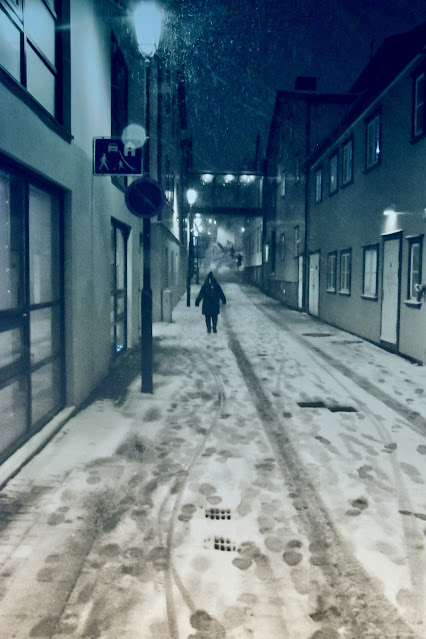 |
| M.A.Reilly, December 2021 |
Winter Recipes from the Collective
1.Each year when winter came, the old men enteredthe woods to gather the moss that grewon the north side of certain junipers.It was slow work, taking many days, though thesewere short days because the light was waning,and when their packs were full, painfullythey made their way home, moss being heavy to carry.The wives fermented these mosses, a time-consuming projectespecially for people so oldthey had been born in another century.But they had patience, these elderly men and women,such as you and I can hardly imagine,and when the moss was cured, it was with wild mustards and sturdy herbspacked between the halves of ciabattine, and weighted like pan bagnat,after which the thing was done: an "invigorating winter sandwich"it was called, but no one saidit was good to eat; it was what you atewhen there was nothing else, like matzoh in the desert, whichour parents called the bread of affliction— Some yearsan old man would not return from the woods, and then his wife would needa new life, as a nurse's helper, or to supervisethe young people who did the heavy work, or to sellthe sandwiches in the open market as the snow fell, wrappedin wax paper— The book containsonly recipes for winter, when life is hard. In spring,anyone can make a fine meal. 2.Of the moss, the prettiest was savedfor bonsai, for whicha small room had been designated,though few of us had the gift,and even then a long apprenticeshipwas necessary, the rules being complicated.A bright light shone on the specimen being pruned,never into animal shapes, which were frowned on,only into those shapesnatural to the species— Those of us who watchedsometimes chose the container, in my casea porcelain bowl, given me by my grandmother.The wind grew harsher around us.Under the bright light, my friendwho was shaping the tree set down her shears.The tree seemed beautiful to me,not finished perhaps, still it was beautiful, the mossdraped around its roots— I was notpermitted to prune it but I held the bowl in my hands,a pine blowing in high windlike man in the universe. 3.As I said, the work was hard—not simply caring for the little treesbut caring for ourselves as well,feeding ourselves, cleaning the public rooms—But the trees were everything.And how sad we were when one died,and they do die, despite having beenremoved from nature; all things die eventually.I minded most with the ones who lost their leaves,which would pile up on the moss and stones—The trees were miniature, as I have said,but there is no such thing as death in miniature.Shadows passing over snow,steps approaching and going away.The dead leaves lay on the stones;there was no wind to lift them. 4.It was as dark as it would ever bebut then I knew to expect this,the month being December, the month of darkness.It was early morning. I was walkingfrom my room to the arboretum; for obvious reasons,we were encouraged never to be alone,but exceptions were made—I could seethe arboretum glowing across the snow;the trees had been hung with tiny lights,I remember thinking how they must bevisible from far away, not that we went, mainly,far away—Everything was still.In the kitchen, sandwiches were being wrapped for market.My friend used to do this work.Huli songli, our instructor called her,giver of care. I rememberwatching her: inside the door,procedures written on a card in Chinese characterstranslated as the same things in the same order,and underneath: We have deprived them of their origins,they have come to need us now
No comments:
Post a Comment
Note: Only a member of this blog may post a comment.